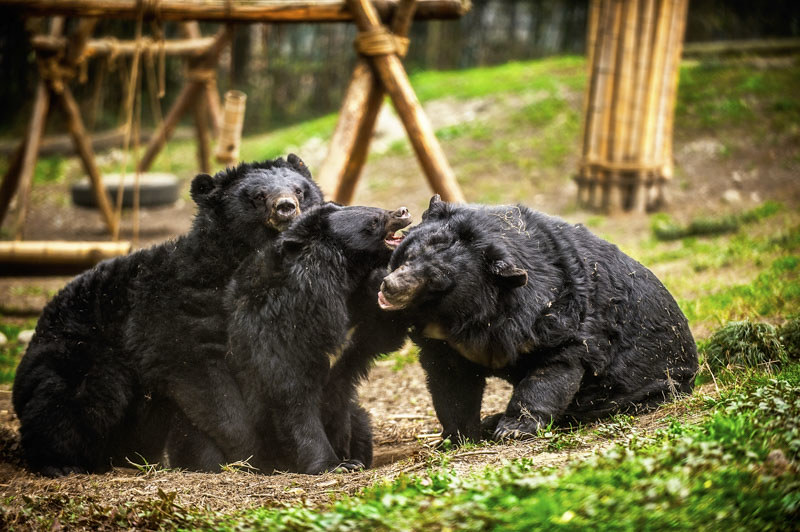#20thAnniversary: Take a tour of the sanctuary which alerted the world to bear bile farming with founder Jill Robinson
19 November 2018

Jill Robinson takes you on a tour of Animals Asia’s China sanctuary, where hundreds of rescued bears tell the world about bile farm cruelty.
When Animals Asia was founded in 1998, few people had ever heard of bear bile farming.
Since then, the practice by which bears are held in tiny cages for their entire lives so that their bile can be extracted for use in traditional medicine, has shocked the world.
And key to sounding the alarm about one of the world’s most extreme examples of animal abuse, was Animals Asia’s China Bear Rescue Centre.
Since the first bears began to arrive in 2000, 286 rescued bears have called the facility home.
And these bears, fortunate enough to be saved from some of the country’s most brutal farms, have proven the most effective ambassadors for raising awareness of the industry’s cruelty.
The litany of health problems they suffer, including cancer, blindness, infections and missing limbs, in tandem with the mental trauma they forever endure, has convinced many around the world that the bear bile industry must end.
To celebrate Animals Asia’s 20th anniversary year, Founder and CEO, Jill Robinson takes you on a personal tour of the sanctuary which has been pivotal to ending bear bile farming and invites you to meet the bears who have bravely come through their trauma, now living contented, happy lives.
Part I
In part I, Jill takes us to an area where the tiny bile farm cages, which held the bears for so many years, are kept on display as a constant reminder of where the bears came from. They look small for a cat let alone a bear and many of the bears unfortunate enough to suffer years of such confinement actually grew into the shape of their cage.
Then we visit Bear House 3 where moon bears like Stardust and his friends live happy lives after rescue: playing on the grass, swimming in pools and climbing trees.
Part II
Jill brings us to the sanctuary hospital, where each bear receives state-of-the-art health checks every two years.
While we visit, moon bear Kevin is on the surgery table being examined by Senior Veterinarian Emily Drayton, who thankfully gives smiling Kevin a clean bill of health.
Part III
In this section of the tour, we visit the Special Bear Care areas, where bears with special needs such as blindness or mobility problems receive the extra care and attention they need to live active lives.
To help the bears continue to forage and express natural behaviours, much of the enclosure furniture is modified to make access easier for the bears.
Part IV
“We’re not weaker without you but stronger because of you.” So reads the inscription on the gravestone of moon bear Andrew, the first to be rescued by the sanctuary. Now he and many other bears are remembered in the sanctuary’s Garden of Rest.
During the tour, Jill said:
“Whenever I’m feeling a little bit down or upset, I’ll just come here to spend a little time at the gravesite and reflect on the happiness that these bears gave us.
“Here in this most beautiful place of peace and tranquility it’s really not like the bears have left us at all. They are still with us in spirit and they are still respected more than they can ever know.”
Finally, Jill takes us to the herb garden where traditional medicine alternatives to bear bile are grown. The garden represents the hope for a bear bile farm-free future. A future free of suffering. A future without cruelty. The future we continue to work towards every single day.
From humble beginnings 20 years ago, Animals Asia has gone on to raise the alarm about bear bile farming around the world, rescued over 600 bears, and convinced the Vietnamese government to completely end bear bile farming by 2022.
It is amazing what can be achieved when animal lovers around the world unite against cruelty. One person can make all the difference. And you can too…
By pledging a monthly gift today, you can join our global community of compassionate people who refuse to be spectators to animal suffering in Asia.
BACK

.png)



